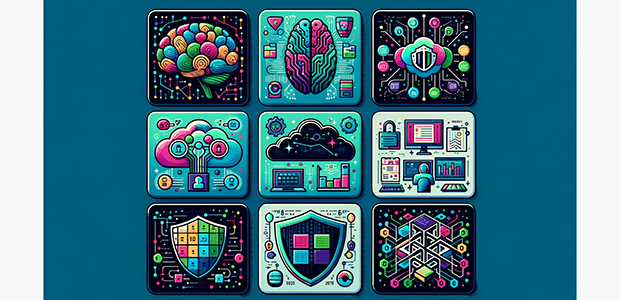
Six most in-demand tech skills for 2024
The top six most in-demand skills in the technology industry for 2024 have been revealed.
FDM Group, a global business and tech consultancy company, has identified six of the most in-demand tech skills for the 12 months ahead. From Artificial Intelligence to cloud software, it’s essential to familiarise yourself with these skills if you’re hoping to step into a new technology role in 2024.
The technology industry is booming and there’s a wealth of exciting opportunities out there for tech professionals in the UK, offering not only high earning potential, but also job satisfaction and security. And since it’s very much a candidate's market in the tech industry, job seekers have the opportunity to find a role that truly ticks all their boxes.
In fact, according to Business Wire, research shows that over half of tech professionals feel comfortable enough in their skills and current market prospects to change jobs, putting tech candidates in a very powerful position, as a record number of employers are now on the lookout for the top tech talent to fill their skills gaps.
Sheila Flavell, CBE, COO at FDM Group, said: "So far this year, the technology industry has continued to boom, creating a vibrant marketplace for those with key skills in areas like Machine Learning, Artificial Intelligence, data storytelling, cyber security, User Experience Design, cloud computing, and blockchain.
“These skills hold immense potential for tech professionals, enabling them to carve a rewarding career path while answering the pressing tech needs of the contemporary world.”
Here are six of the most in-demand skills for those working within the technology industry in 2024.
Machine Learning (ML) and Artificial Intelligence (AI)
Key essential skills for those who want to work in Machine Learning and Artificial Intelligence include domain knowledge, programming languages, and data analysis.
In recent years, Machine Learning (ML) and Artificial Intelligence (AI) have become a huge part of our daily lives – whether that’s talking to a human-like chatbot online or asking Alexa to play our favourite song.
In fact, it looks as if candidates are already looking to improve their AI skills as recruitment insights reveal that the number of professionals on LinkedIn with AI skills has increased by 68% this year.
Data handling and storytelling
Data roles will encompass more than just handling and interpretation. In 2023, according to Forbes, data communication and storytelling were two key skills for people to have, as an increasing number of jobs require teams to work with data and this year is no different, especially with the increased focus on AI.
This includes data collection, preparation, visualisation, analysis, and storytelling. Essentially, the focus will be on transforming data into digestible and useful insights to be shared and, most importantly, understood across teams and external parties – be that stakeholders or customers.
Cyber security
Cyber-attacks and data breaches are on the rise and businesses are beginning to feel the financial impact of this. Especially with many employees now working remotely, using their own internet networks and electronic devices, there is an even greater threat posed to businesses and their data. As a result, many are falling victim to hefty fines, suffering from reputational damage, and losing customer trust.
Cyber security specialists will still be in high demand to work on larger, more complex projects, such as handling sensitive data, dealing with cloud migrations, and protecting a company's IT infrastructure. According to Analytics Insights, it is estimated that an incredible 10 million jobs were needed in cyber security in 2023 alone and the UK government has launched the £2.6 billion National Cyber Strategy, aimed at increasing the number and diversity of skilled individuals in cyber security.
User Experience (UX) Design
Some of the skills required for a UX Designer include conducting market and audience research, creating user personas, designing wireframes, and carrying out testing. Although coding knowledge is not essential to the role, a solid understanding of programming languages could give you a competitive edge in the job market.
UX Designers are responsible for making sure technology is user-friendly – whether that’s reconsidering font size and style to improve a mobile banking app, categorising article themes to help users find what they are looking for on a blog, or adding a favourites function on an e-commerce shop. Without UX Designers, technology would be difficult to use and people would be less likely to buy it.
Cloud Computing
The global Cloud Computing market is expected to grow at a CAGR of 17.8% between 2023 to 2032, taking it to a projected value of $42,495.2 billion. And with 82% of businesses considering cloud migration as an essential step in their digital transformation, Cloud Computing will play a vital role in modernisation and growth for organisations across the world.
However, to facilitate this expansion, businesses will need to hire the very finest cloud professionals, who are comfortable with programming languages, such as SQL and Linux, database management, AI and ML, and cloud technologies, like AWS, Google, Oracle, and Microsoft.
Blockchain
Blockchain is gaining popularity due to its secure and transparent nature, recording transactions across a network and creating an immutable chain. Its cryptographic features ensure data integrity, making it ideal for applications like cryptocurrency, smart contracts, and transparent supply chains, driving widespread adoption across industries.
Companies are increasingly integrating blockchain solutions, creating a demand for skilled professionals. As blockchain applications diversify beyond cryptocurrencies to areas like finance, healthcare, and supply chain, individuals with blockchain skills are positioned for exciting and varied career opportunities.

